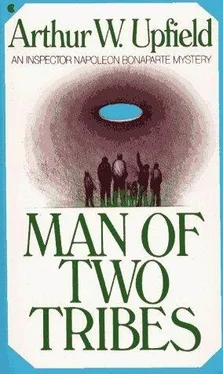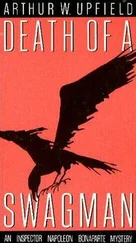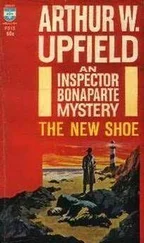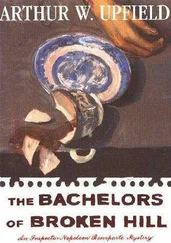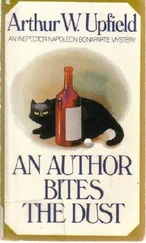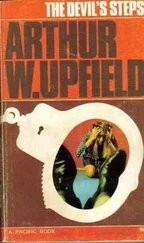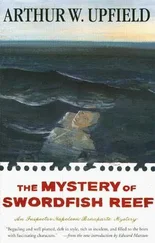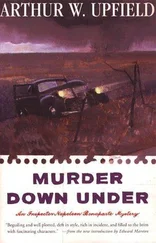Arthur Upfield - Man of Two Tribes
Здесь есть возможность читать онлайн «Arthur Upfield - Man of Two Tribes» весь текст электронной книги совершенно бесплатно (целиком полную версию без сокращений). В некоторых случаях можно слушать аудио, скачать через торрент в формате fb2 и присутствует краткое содержание. Жанр: Классический детектив, на английском языке. Описание произведения, (предисловие) а так же отзывы посетителей доступны на портале библиотеки ЛибКат.
- Название:Man of Two Tribes
- Автор:
- Жанр:
- Год:неизвестен
- ISBN:нет данных
- Рейтинг книги:4 / 5. Голосов: 1
-
Избранное:Добавить в избранное
- Отзывы:
-
Ваша оценка:
- 80
- 1
- 2
- 3
- 4
- 5
Man of Two Tribes: краткое содержание, описание и аннотация
Предлагаем к чтению аннотацию, описание, краткое содержание или предисловие (зависит от того, что написал сам автор книги «Man of Two Tribes»). Если вы не нашли необходимую информацию о книге — напишите в комментариях, мы постараемся отыскать её.
Man of Two Tribes — читать онлайн бесплатно полную книгу (весь текст) целиком
Ниже представлен текст книги, разбитый по страницам. Система сохранения места последней прочитанной страницы, позволяет с удобством читать онлайн бесплатно книгу «Man of Two Tribes», без необходимости каждый раз заново искать на чём Вы остановились. Поставьте закладку, и сможете в любой момент перейти на страницу, на которой закончили чтение.
Интервал:
Закладка:
When at Mount Singular, he had acted the character of the half-caste to perfection. Now he acted, without conscious effort, the character of the full-blood aborigine, for his maternal instincts were in the ascendant.
Today his eyes were never still. From his face was gone the usual expression of calm confidence. He glanced constantly to the rear, jerking his head when normally he would have made the movement with deliberation. The Plain was at long last making itself felt, as it had made itself wholly felt on the full bloods, to the extent that they would not spend a night on it. It could be that the change in this man was being transmitted to Millie.
Today she walked on her toes. Today her cat ears constantly turned to the rear, and constantly she looked to the right and to the left.
Chapter Eight
Barriers of Straw
THEPLAINwas a tessellated pavement, hurrying black shadows coming to meet the camels and giving the rider the impression that he was travelling at high speed. The sky this morning was uniform cadmium between isolated clouds, and the wind from the northern desert was warm and scented, yet filled with the promise of heat and dust.
About mid-morning Bony sighted an abnormal feature which proved to be an apparently endless ribbon of straw about twenty feet wide, and in places a foot thick. It lay approximately east-west, and from the condition of the straw, he thought it must be at least a year old.
Reference in the diary to the Buckbush Road had aroused his interest and, now that he gazed upon it, he was reminded of the Yellow Brick Road to The Wizard of Oz. A mile or two farther on was another buckbush road, and the next day, yet a third ribbon which was much less weathered, and which gave the answer to the riddle.
There was a year of wonderful life and vigour in what is stupidly called the ‘Dead Heart of Australia’, when the alleged desert bloomed with an extraordinary profusion of flowers, and when all the earth was vivid green with buckbush.
This annual shrub will grow to the size of a water ball, and when dead is a sphere of filigree straw. The wind snaps it from the parent stalk and rolls it onward. Millions of these balls, driven by the wind, will roll over the ground like hurdling horses, will pile against fences until the barrier is such that the following balls ‘run’ up and over.
At the end of this fertile year, the north wind had driven the buckbush from the desert uplands down to the Plain, and the saltbush had opposed it until it had gathered into a rope many feet high and many feet thick, when the entire rope of miles in length had rolled on and on. Then, when the wild wind had dropped, the ropes of straw became stationary, and the rain had come to sodden and rot them.
Old Lonergan had named one of his camps The Brisbane Line, the term being a sarcastic reference to an imagined plan of defence when the Japanese were doing their stuff. It was the fourth camp north of Bumblefoot Hole, and on the southern edge of a straw barrier which Bony estimated as being twelve feet high. As far as he could see to east and west, there was no break save that at the camp, which had been made by the old trapper with the smashing blade of a shovel. And there it would remain until another mighty wind moved it on again.
Beyond this wall of straw the going was again dangerous, being littered with rock chips; areas of rock roofing beneath which were caverns and passages. Bony saw holes, some having a diameter of a few inches, others of several feet. Many holes were easily seen, others were masked by saltbush, but Millie knew the track and never once faltered or evinced fear. All day they had travelled over this dangerous country, and Bony hoped to camp at what Lonergan called The Belfry. Thehorizon, still distant, was now broken by what seemed to be ridges of red rock, but were the summits of sand dunes.
There was certainly nothing between him and those sand dunes indicative of a church, and when the sun was sinking under the Plain his attention was drawn to a swirling column of dark ‘smoke’ issuing from the ground as though from volcanic action.
The camels had no fear of this place: Millie hastened her pace to reach it. The ‘smoke’ endlessly whirled upward to be flattened as though by a cold wedge when less than a hundred feet above ground, and Bony could detect the units comprising a great host of bats. They came up from a small replica of Bumblefoot Hole, and so entranced by them was he that he was almost thrown out of the saddle when Millie ‘flomped’ to her knees, yawned, and told him to get on with the job of making camp.
There, but a few feet beyond her head, was the site of Lonergan’s camp fires.
The bank of the hole nearest the camp shelved slightly to the cliff-face, and from this face the bats continued to issue, in number not to be estimated. Obviously they inhabited an underground cavern, which Bony had no intention of exploring. He found Lonergan’s water hole and, having watered thecamels, he lit a fire and watched the emergence of the bat army.
Night was chasing Day beyond land’s end, and the bat cloud banished the glory of the evening sky as Bony shovelled earth over his fire, laid out his bedding, and drew theunpitched tent over himself and the dog, who liked bats even less than he. There would be no bread baking this night, and when Millie and Curley came close for their usual crusts, to find the cupboard bare, they put themselves downbeside the tent covering and sulkily went to sleep.
Their bells roused Bony at dawning. Then the sky was clear and the stars were bright, but with the daylight came the bats from all quarters, to hover again like a rain cloud which formed a living water-spout gradually descending into the cavern. Before the sun rose there wasn’t a bat above ground.
The days passed and the camps were left behind: Lunatic’s Moan, a blow-hole from which air rushed with a continuous moaning noise; Lover’s Lane, where was a rock-hole between two great barriers of straw. Since Lonergan was last here, both barriers had been moved and the trapper’s path wiped out but Millie ploughed through the masses, a ton of which would dwarf a cathedral.
It rained half an inch the night they spent at Curley’s Hate, and the next day they walked up from the Plain on to the wind-ribbed sand of the desert, then turned east to reach the extremity of Lonergan’s trap-line, where they found his fire-site in the shadow of twobelar trees. Trees! O blessed trees! To hear the soft sunset-wind singing its lullaby in a roof of trees! Far into the night Bony sat by his fire of solid wood, and frequently praised old dead Patsy for having named this place The Bushman’s Home.
The rain had filled the shallow claypans between the dunes, and water had run into the deeper depressions along the verge of the Nullarbor Plain. On the lower dunes the young buckbush attracted the camels, but even so soon after the rain the wind crested the high dunes with red feathers.
The rain provided independence of rock-holes, but it was also disadvantageous in that it wiped smooth this page of the Book of the Bush, and thus much valuable information would be withheld until time enabled the new printing to be done.
Bony remained in camp at The Bushman’s Home for two days, scouting on foot, when he chanced on a group of kangaroos, and bagged one. Wild dogs were here, and rabbits were numerous, andall this world was kind and protective.
But inland from this northern ‘coast’ the country rapidly deteriorated. Penetrating it for three miles, he found that the dunes dwindled into a sea of spinifex slopes and naked gibber flats, the gibber stones so polished by the wind-driven sand particles that the upper surfaces reflected the sun with such power as to torture the eyes. Far to the north lay a line of flat-topped residuals, red and bare, and onward for two thousand miles it would be just the same as this picture of the Great Inland Desert, populated by aborigines never in contact with the white man, and so dispersed that for one to be killed by a rocket would almost bean impossibility.
Читать дальшеИнтервал:
Закладка:
Похожие книги на «Man of Two Tribes»
Представляем Вашему вниманию похожие книги на «Man of Two Tribes» списком для выбора. Мы отобрали схожую по названию и смыслу литературу в надежде предоставить читателям больше вариантов отыскать новые, интересные, ещё непрочитанные произведения.
Обсуждение, отзывы о книге «Man of Two Tribes» и просто собственные мнения читателей. Оставьте ваши комментарии, напишите, что Вы думаете о произведении, его смысле или главных героях. Укажите что конкретно понравилось, а что нет, и почему Вы так считаете.
